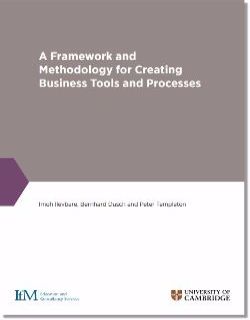Bridging the gap - How to create business tools and processes that really work

 Dr Imoh Ilevbare, Product Manager for IfM Education and Consultancy Services, describes the IfM’s approach to developing business tools and processes from cutting-edge research.
Dr Imoh Ilevbare, Product Manager for IfM Education and Consultancy Services, describes the IfM’s approach to developing business tools and processes from cutting-edge research.
Is management research useful for people working in industry? Can it create new capabilities, influence decisions or inform actions? These somewhat fundamental questions are currently the subject of intense academic debate.
Whichever side of the argument you come down on, the reality facing academics is that their work is increasingly being measured on its relevance to, and impact on, the world beyond academia. Being able to bridge the gap between management research and practice is, arguably, becoming more important than ever before. It is also a topic of profound interest to the IfM which was conceived as a place where research meets practice – and where industrial collaboration continues to underpin everything we do. With nearly 20 years’ experience of transferring knowledge behind us, now seemed a good time to share our methods with a wider audience.
Why might a research-practice gap – or the perception of one – exist? Some of the reasons may relate to career structures within research institutions which often fail to incentivise ‘real world’ engagement. Barriers such as these can be difficult to overcome but others are easier to address. Researchers and practitioners tend not to ‘talk the same language’ and to represent information in completely different ways. Much of the research-practice challenge can be summed up in two phrases: ‘knowledge production’ and ‘knowledge transfer’.
Knowledge production becomes a problem when the research is simply not relevant to the issues faced by industry professionals. This can be solved by scholars and practitioners working closely together to define and develop research agendas. The knowledge transfer problem can be solved by turning the research output into formats that can be readily understood and applied by practitioners.
At the IfM, we recognise both of these issues. Researchers here are encouraged to define their research and frame their questions to resonate with problems faced by industry. Particular attention is given to turning research outputs into practical processes and tools for application by industry professionals. The ‘procedural action research’ approach pioneered by Dr Ken Platts in the 1990s has been particularly crucial to this. Now being applied more widely beyond the IfM and University of Cambridge, this approach provides a rigorous methodology for the creation of business processes through research and for re-shaping existing research output into practical tools.
Having spent nearly two decades applying Ken Platts’ approach, the IfM has now written a more detailed guide to developing tools and processes from research. A framework and methodology for developing business improvement tools provides an understanding of the various types of tools that might be created from a piece of research and a methodology for tool or process development.
When defining a business tool or process to solve a particular management problem, we need to be clear about three things: what are the key activities involved in the business problem, what stage (or stages) of the business improvement cycle – assessment, planning, capability building or execution – does it address and, finally, what is the maturity of the business. Large companies are likely to need tools that are more advanced, more cutting edge to match the complexity of their businesses. Smaller businesses and start-ups, with fewer resources and less complex organisations, may need tools that are lighter touch.
With nearly 20 years’ experience of transferring knowledge behind us, now seemed a good time to share our methods with a wider audience.
The guide provides a step-by-step approach to the design and testing of the business tool or process. Testing is vital. After the initial design phase, a new tool needs to go through rigorous, repeated in-company testing and revisions until it is fit for purpose. The Guide also includes recommendations for tracking the impact of the tool or process on organisations that apply it.
The IfM has been successful at bridging the research-practice gap because it has made it a priority. All our researchers are expected to engage with and solve industry problems. Business tool and process development is only one part of our efforts to ensure knowledge is transferred from research to practice. Through IfM Education and Consultancy Services, we develop and deliver executive education and capability development programmes, provide consultancy and facilitation services and publish workbooks and reports aimed at practitioners. Maintaining an outward-facing stance puts us in a stronger position to identify research opportunities that are relevant to industry. The tools and processes generated from such research deliver the type of direct impact presently expected of management research from worldleading universities.
A framework and methodology for developing business improvement tools and processes by Imoh Ilevbare, Bernhard Dusch and Peter Templeton is available here for download.
 For more information, please contact:
For more information, please contact:
Dr Imoh Ilevbare
IfM Review Issue 5 Articles
 'A social network of things' - New approaches to asset management
'A social network of things' - New approaches to asset management
 The Cambridge Value Mapping Tool
The Cambridge Value Mapping Tool


 The innovation game
The innovation game
 Liquid assets
Liquid assets Roadmapping at BASF
Roadmapping at BASF Bridging the gap
Bridging the gap Manufacturing Leaders
Manufacturing Leaders







